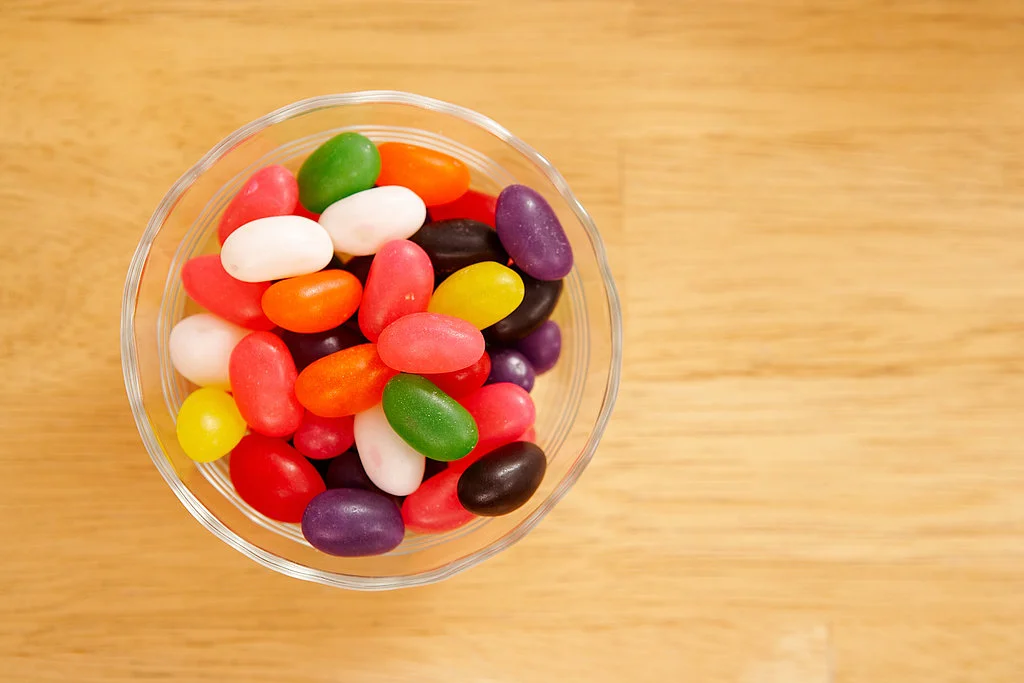Close your eyes and imagine this with me... (Or rather, do whatever the eyes-open-so-you-can-still-read-this version of that would be.)
You have in your possession a bowlful of jelly beans that represents your supply of energy to get through the day: physical, emotional, mental, and relational energy.
Every single person on the planet has their own small bowl of jelly beans every single day. As we go about our lives, we lose a jelly bean each time we expend a significant amount of energy. Thankfully, most people have more than enough in their pile for the day's needs. So much so, that they're not even aware of how many jelly beans they have or how many they use up in a day. They don't need to pay attention to that because they have a sufficient amount at their disposal.
It's different for anyone battling chronic illness.
I know.
I have fibromyalgia, Chronic Active Epstein-Barr Virus, Rocky Mountain Spotted Fever, chronic fatigue syndrome, IBS, endometriosis, and a heart condition (IST/SVT). And I assure you: My daily jelly bean pile is far smaller than I wish it were.
Those of us with chronic pain, fatigue, and/or illness are acutely aware of how we spend our finite supply of jelly beans.
We don't sleep well, so we usually wake up in the morning feeling no more rested than when we went to bed the night before. We lose a jelly bean (or possibly a few) simply by forcing ourselves out of bed, into the shower, and through the process of getting ready for the day. If it's a high pain day or we are in flare, we may use up a quarter of our supply before we even leave the house—before the day has really even started.
We go to work and quickly lose jelly beans left and right: for sitting too long, for standing too long, for engaging in conversation, for doing our job well, for not taking pain relievers before the last ones wear off, for trying to minimize others' awareness of our health, for running back and forth to the bathroom, for typing too much, for walking too far... Jelly bean. Jelly bean. Jelly bean. Jelly bean.
By the time we leave work, our bowlful is now a mere handful.
And then there's still the rest of life. Laundry, -1. Dishes, -1. Cooking, -1. Cleaning the house, -1. Exercise, -5. Family demands, stress, financial concerns, -10.
This is all before we've even gotten to do anything we really want to do, like spending time with friends (jelly bean), hosting others for a meal (jelly bean), playing a game with our kids (jelly bean), or going for a walk (jelly bean).
Quite often, there simply isn't enough energy to do everything we need and want to do.
There just isn't.
So we are forced to make choices about how we use our jelly beans—how we want to spend (and how we need to save) our energy.
Out of necessity, we are acutely aware at all times of how much we have left in our reserve tank. We have to ration. We have to decide when, where, with whom, and why we are going to expend our energy. We have to decide how close to the last jelly bean we should let ourselves get—because what if an emergency arises that demands more of us than we have left to give?
We're forced to make choices that others never need to consider, because they don't get down to the bottom of their jelly bean stash every single day like we do. Clean the house or catch up with a loved one on the phone? There may not be enough physical or mental capacity to do both.
Sometimes we borrow from the next day's bowl, but we know we have to pay it right back—with interest. And so we negotiate with ourselves until we find a compromise. I'll go out with friends tonight and spend the next couple evenings quietly at home.
And every night, we go to sleep with an empty bowl—hoping our jelly bean pile fully restocks overnight as we already begin anticipating the next day's to-do lists and stressors.
Lather. Rinse. Repeat.
Saying all of this scares me a little bit. (Okay, a lot a bit.) I'm afraid of coming across as more dire or desperate or hopeless than I intend. My aim isn't pity (or even sympathy), but understanding.
(While I realize that if you don't live with persistent illness or pain, it's impossible to fully comprehend, I figure every little bit of clarity helps us better care for those we care about.)
What you've got to realize is that this becomes our normal. We—or at least I—no longer spend too much time really thinking about the nuances of these habits; they've just become second nature. Sure, there's the occasional woe-is-me moment when I may contrast my life with others', and deep down I wish for different, but mostly I've adjusted and learned to live this way. What other choice do I really have?
If you don't personally live with chronic pain or illness, I imagine you have someone in your life who does. And though you can't loan them any of your own jelly beans, you can give them the gift of your presence, grace, support, and understanding.
And wine.
Wine always helps.
(Incidentally, wine doesn't pair well with jelly beans. So bring chocolate too.)

